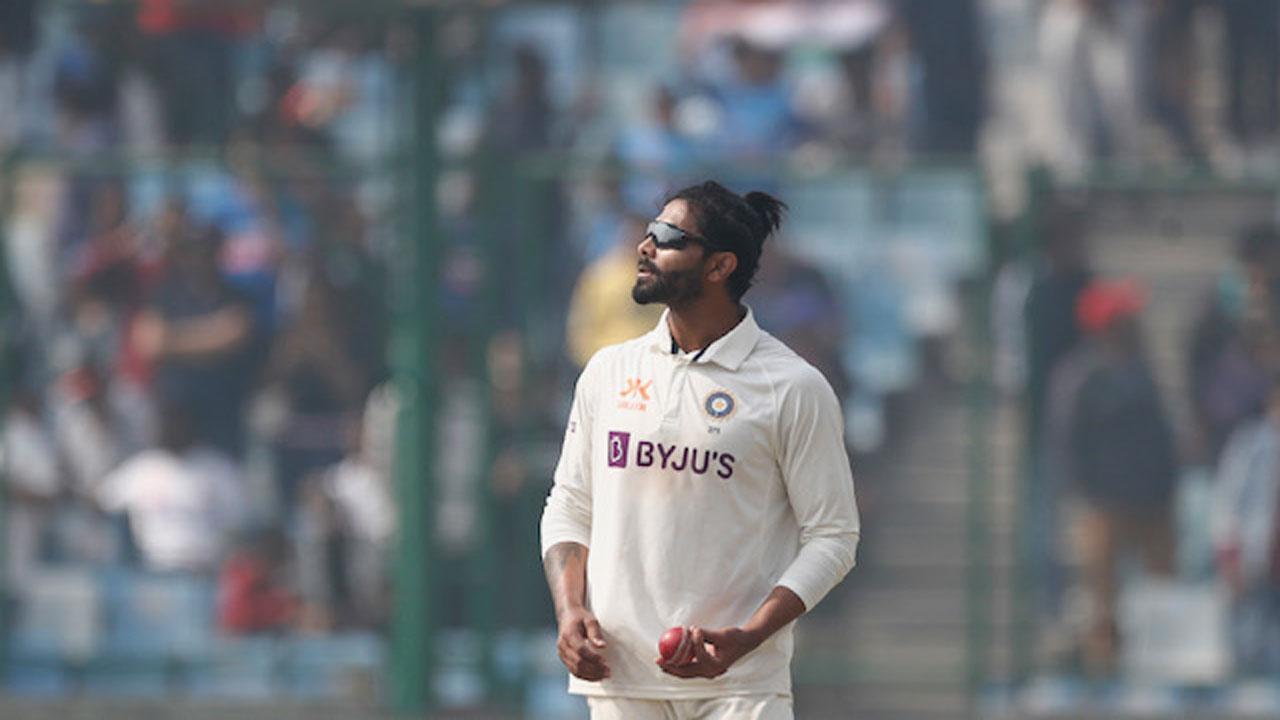Ravindra Jadeja was allowed to run away with his own hubris and talk the captain into two referrals

Ravindra Jadeja during the Delhi Test. Pic/Getty Images
 Let’s do what India did on the first morning in Indore and rush in where angels fear to tread. No gentle forays – let’s jump down the pitch and play the big shots.
Let’s do what India did on the first morning in Indore and rush in where angels fear to tread. No gentle forays – let’s jump down the pitch and play the big shots.
ADVERTISEMENT
Finally winning the toss and batting on a pitch that is likely to deteriorate in the fourth innings is not much use if you’re bowling an hour after lunch. Strategic high ground ceded! In my earlier mid-day piece, I alluded to the fact that it’s not easy to win a Test in a single session, but you can sure lose one. Throughout this series, both teams have taken that to heart. Australia did it in their second innings in Nagpur and Delhi, but India jumped the gun by handing the game to Australia by lunch on Day 1.
Let’s be honest. If Australia had seized the advantage in Delhi when India were 130-7, this series could well be 2-1 to the visitors. Much of India’s thinking for the Indore Test appeared muddled.
Axar Patel is almost a specialist batsman at nine. Why he wasn’t moved up the order to give Cheteshwar Pujara some stability in the second innings will remain a mystery.
Mohammad Siraj’s selection was a complete waste of a position. India might as well have played with 10 plus a sub-fielder. If local knowledge suggests that the pitch was going to be this spin-friendly, why not just play the extra batsman?
In a recent article, I said that in India, your heart guides you more than your head. This was never truer than that crazy evening when Ravindra Jadeja was allowed to run away with his own hubris and talk the captain into two referrals that were clearly not out even at first glance. The gun-shy Indians then eschewed a referral against Marnus Labuschagne a few minutes later which could have changed the game. This, after he was bowled off a no-ball. In Ahmedabad, India must surely have the discipline to revert to a rational system of referrals rather than just trusting Jadeja’s excitable instincts.
Desperation is not a good enough reason to burn a review.
On that note, it must surely be on the ICC’s radar to look at the ridiculous situation where teams whip off the bails and ask for a stumping review because they know full well that it gives them a free caught behind review. That is a clear example of gaming the system. If fielding teams want to check for a snick, they should be forced to use a review or just be content with a side-on or Stump-Cam angle for the stumping.
The modern Asian batsman is no longer the consummate players of spin that their predecessors were. All across Asia, sharply spinning decks are proving a challenge for home teams. Pakistan, Bangladesh and Sri Lanka have poor recent records against touring teams. India have triumphed because their spinners are superior to the opposition, but when it comes to their batsmanship, the modern generation do not have the patience and soft hands of the Fab Four generation or even the silky skills of the Gavaskar-Vishwanath-Vengsarkar era. Today’s batsmen are far more devastating on flat tracks but appear to lack the patience and craftsmanship to grind their way, Pujara-like in the second innings, on tracks that turn sharply.
The fourth Test in Ahmedabad will test India’s resolve. A resurgent Australia no longer fear India’s aura. If the pitch is similar, it will require the Indians to trust their defence for longer, shrug off the unplayable ball and wait patiently for a loose ball. Rotating strike with singles may be safer than running down the pitch like both Indian openers did in Indore. Both rash dismissals opened the door for Australia in each innings and from that point, India were always playing catch-up. For once, their tail did not rescue them and the frailty of the top order was exposed.
Inconvenient truths are hard to swallow but bitter medicine may be what India needs. The bottom line is that in the first two Tests, it was India’s lower order that was the difference. Australia realise this and will make plans to exploit this weakness. Preying on the ego of the top order will be part of that plan. This is still Test cricket…wait for the IPL before you dash down the pitch on flat, true pitches.
Michael Jeh is a Brisbane-based former first-class cricketer.
 Subscribe today by clicking the link and stay updated with the latest news!" Click here!
Subscribe today by clicking the link and stay updated with the latest news!" Click here!







